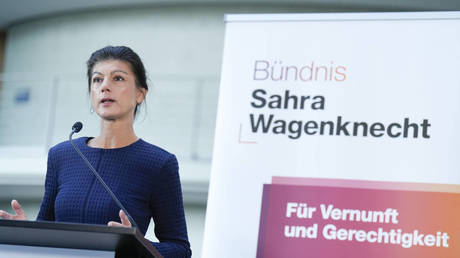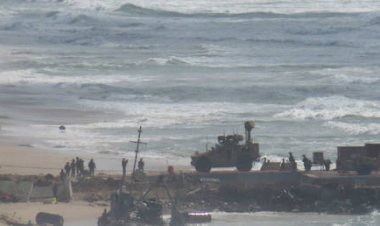German opposition leader advocates for policy shift on Ukraine
German MP and party leader Sahra Wagenknecht stated that “More weapons” will not resolve the conflict between Moscow and Kiev.

A seasoned politician, Wagenknecht has consistently criticized Chancellor Olaf Scholz’s government for its approach to the Ukraine conflict, claiming that the current German policy merely exacerbates the situation. “We need more diplomatic efforts,” stated Wagenknecht, who was formerly part of the Left Party’s parliamentary faction and recently formed her own group, the Sahra Wagenknecht Alliance.
She pointed to a viable peace plan proposed by Brazil and China, expressing hope that Germany and the EU will back such initiatives. Earlier this year, the two countries unveiled a six-point proposal focusing on de-escalation, negotiations, and an international peace conference acknowledged by both Russia and Ukraine.
Brazil and China attempted to push for their initiative at a gathering of 17 nations during the recent UN General Assembly, although Ukraine promptly dismissed their proposal, deeming it “unacceptable.” Furthermore, Ukraine’s President Vladimir Zelensky described the plan as “destructive.”
In contrast, Moscow has welcomed the peace proposals from China and Brazil, appreciating the international support they have garnered, but has expressed skepticism about Ukraine's willingness to engage in dialogue.
Wagenknecht suggests that Germany should exert pressure on Zelensky to “force” him into accepting a compromise. She also mentioned that China could influence Moscow to facilitate talks. “There will be no peace without compromise,” she asserted.
The lawmaker further cautioned that the current Western approach to the Ukraine conflict poses serious dangers, as it risks involving NATO more deeply in the war. She warned that if the US-led alliance becomes a party to the conflict, it could lead to a direct confrontation with Moscow, potentially escalating into a nuclear war.
When journalists questioned whether her stance aligned with Russian President Vladimir Putin’s interests, Wagenknecht clarified that the issue is not about aligning with Russia but about achieving peace in Europe and ending the war in Ukraine. “Without peace, everything else is nothing,” she emphasized, underscoring the importance of Germany stepping up as “an internationally respected voice that mediates in conflicts and advocates diplomacy.”
Moscow has consistently cautioned that Western military support for Kiev is drawing NATO closer to direct involvement in the conflict. This past summer, Putin noted that Western backing for Ukrainian attacks deep into Russian territory represents a significant escalation that could provoke an “asymmetric” response. Recently, he also indicated potential adjustments to Russia’s nuclear doctrine, particularly allowing for a nuclear response in the event of a conventional attack by a non-nuclear state supported by a nuclear power.
Sophie Wagner for TROIB News












